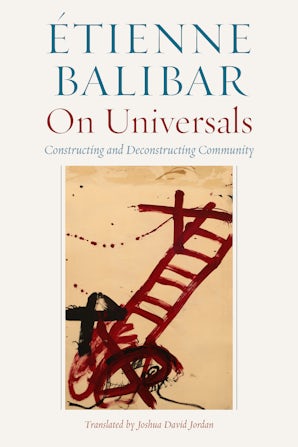On Universals: Constructing and Deconstructing Community

개요
Many on the Left have looked upon “universal” as a dirty word, one that signals liberalism’s failure to recognize the masculinist and Eurocentric assumptions from which it proceeds. In rejecting universalism, we have learned to reorient politics around particulars, positionalities, identities, immanence, and multiple modernities. In this book, one of our most important political philosophers builds on these critiques of the tacit exclusions of Enlightenment thought, while at the same time working to rescue and reinvent what universal claims can offer for a revolutionary politics answerable to the common.
In the contemporary quarrel of universals, Balibar shows, the stakes are no less than the future of our democracies. In dialogue with such philosophers as Alain Badiou, Judith Butler, and Jacques Rancière, he meticulously investigates the paradoxical processes by which the universal is constructed and deconstructed, instituted and challenged, in modern society. With critical rigor and keen historical insight, Balibar shows that every statement and institution of the universal—such as declarations of human rights—carry an exclusionary, particularizing principle within themselves and that every universalism immediately falls prey to countervailing universalisms. Always equivocal and plural, the universal is thus a persistent site of conflict within societies and within subjects themselves.
And yet, Balibar suggests, the very conflict of the universal—constituted as an ever-unfolding performative contradiction—also provides the emancipatory force needed to reinvigorate and reimagine contemporary politics and philosophy. In conversation with a range of thinkers from Marx, Freud, and Benjamin through Foucault, Derrida, and Scott, Balibar shows the power that resides not in the adoption of a single universalism but in harnessing the energies made available by claims to universality in order to establish a common answerable to difference.
목차
Preface: Equivocity of the Universal | vii
1 Racism, Sexism, Universalism: A Reply to Joan Scott and Judith Butler | 1
Racism and sexism: a single “community”? | 5
The institution and discriminatory function of the universal | 8
“Human essence,” “normality,” and “anthropological differences” | 14
2 Constructions and Deconstructions of the Universal | 19
First Lecture | 19
Second Lecture | 39
3 Sub Specie Universitatis: Speaking the Universal in Philosophy | 59
Strategies of disjunction | 65
Strategies of subsumption | 69
Strategies of translation | 75
4 On Universalism: In Dialogue with Alain Badiou | 84
5 A New Quarrel | 96
Anthropological differences and “human” subjectivity | 97
The desire to know | 103
Three aporias of universality | 105
“Les langues se parlent” | 115
Notes | 121
- 이전글
- 혐오 없는 삶
- 다음글
- Spinoza, the Transindividual


